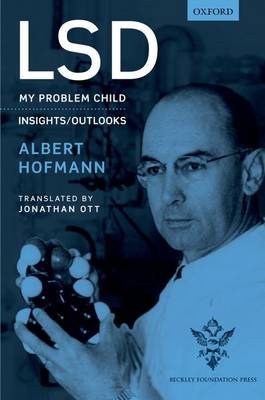
LSD
Oxford University Press (Verlag)
978-0-19-963941-0 (ISBN)
- Titel ist leider vergriffen;
keine Neuauflage - Artikel merken
Albert Hofmann, who died in 2008 aged 102, first synthesized lysergic acid diethylamide (LSD) in 1938, but the results of animal tests were so unremarkable that the chemical was abandoned. Driven by intuition, he synthesized it again in 1943, and serendipitously noticed its profound effects on himself. Although his work produced other important drugs, including methergine, hydergine and dihydroergotamine, it was LSD that shaped his career.
After his discovery of LSD's properties, Hofmann spent years researching sacred plants. He succeeded in isolating and synthesizing the active compounds in the Psilocybe mexicana mushroom, which he named psilocybin and psilocin. During the 60s, Hofmann struck up friendships with personalities such as Aldous Huxley, Gordon Wasson, and Timothy Leary. He continued to work at Sandoz until 1971 when he retired as Director of Research for the Department of Natural Products. He subsequently served as a
member of the Nobel Prize Committee, and was nominated by Time magazine as one of the most influential figures of the 20th century.
In 2007, Albert Hofmann asked Amanda Feilding if she could publish his Problem Child, and shortly before his death he approved a new and updated translation of his autobiography (first published by McGraw Hill in 1979). It appears here for the first time in print.
Albert Hofmann is one of the most important scientists of our time, whose discoveries have powerfully influenced culture, society and science. Until its prohibition LSD was seen as a consciousness -expanding "wonder-drug", inducing self-awareness. Between 1943 and 1970 it generated almost 10,000 scientific publications, leading to its description as "the most intensively researched pharmacological substance ever". Hofmann realised that a substance with such profound effects on perception was likely to arouse interest beyond the medical field - though he never expected it to find worldwie recreational use. But "the more its use as an inebriant was disseminated... the more LSD became a problem child." And so LSD was prohibited in the late 1960s, and scientific research into its properties was terminated in the early 1970s.
FOREWORD BY AMANDA FEILDING ; TRANSLATOR'S PREFACE BY JONATHAN OTT ; LSD: MY PROBLEM CHILD ; INSIGHTS/OUTLOOKS
| Erscheint lt. Verlag | 9.4.2013 |
|---|---|
| Übersetzer | Jonathan Ott |
| Verlagsort | Oxford |
| Sprache | englisch |
| Maße | 162 x 240 mm |
| Gewicht | 586 g |
| Themenwelt | Literatur ► Biografien / Erfahrungsberichte |
| Literatur ► Romane / Erzählungen | |
| Kunst / Musik / Theater ► Musik ► Jazz / Blues | |
| Sachbuch/Ratgeber ► Natur / Technik | |
| Geisteswissenschaften ► Psychologie ► Biopsychologie / Neurowissenschaften | |
| Geisteswissenschaften ► Psychologie ► Sucht / Drogen | |
| Medizin / Pharmazie ► Medizinische Fachgebiete ► Psychiatrie / Psychotherapie | |
| Studium ► Querschnittsbereiche ► Geschichte / Ethik der Medizin | |
| Naturwissenschaften ► Biologie ► Zoologie | |
| ISBN-10 | 0-19-963941-8 / 0199639418 |
| ISBN-13 | 978-0-19-963941-0 / 9780199639410 |
| Zustand | Neuware |
| Haben Sie eine Frage zum Produkt? |
aus dem Bereich


